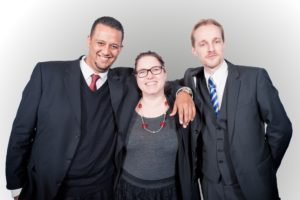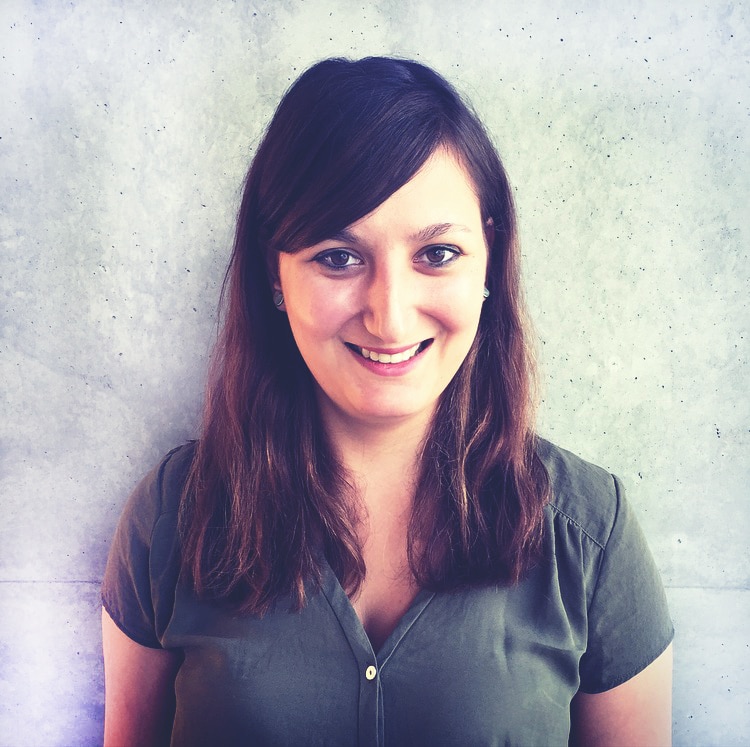Meet our CODE_n CONTEST Finalists 2016: AmbiGate from Germany

AmbiGate, a spin-off of the university of Tubingen, is specialized in 3D sensor solutions. The team, compromising 3 founders and 6 professors, wants to disrupt the physical therapy market through a combination of innovative AI and sensor-motoric algorithms, 3D sensors, and a highly motivating treatment approach called ExerGame. The startup is also a CODE_n CONTEST finalist in the HealthTech cluster. We talked to Caroline Dabels, founder and CMO of AmbiGate, to find out more.
What is AmbiGate all about? How did you come up with the idea?
Caroline:AmbiGate develops innovative motion sensing solutions. Awarded by the federal ministry of economics was our product eReha – a video game-based exercise therapy for domestic and business environment, developed by AmbiGate. It can be used preventively, parallel to physiotherapy and for corporate healthcare programs. As an ExerGame, the system provides medical exercises in a virtual environment. A 3D sensor analyses the patient’s executions and locates false movements in real time. During the workout, innovative disease-specific parameters are measured and sent to the physiotherapist for a dynamic therapy adaptation and progress.

AmbiGate’s highly motivating treatment approach called ExerGame.
Back pain issues affect 70 per cent of the Germans. In numbers these are 56 Mio people causing an economic damage of 55 Billion Euros per year – only in Germany.
Usually patients get a prescription for physiotherapy with 6 times 20 minutes paid by the health insurances. Mostly this is not enough for a sustainable recovery. Therefore therapists recommend home exercises for better therapy progress. But there are two main challenges for home therapy: Motivation and false execution. These issues are solved with eReha. This problem and the research work that one of the founders did at University of Tübingen concerning human machine interface combined with 3D Sensors is how we came up with the idea.
“Digital Disruption“ – that’s the motto of this year’s CODE_n CONTEST. What makes your solution innovative, what makes it disruptive?
Caroline: What we do will change the therapy market fundamentally. Advantages include patients’ home-training data for Physiotherapists, lower costs for health insurance providers dealing with back pain issues, 24/7 training for patients at home and companies can provide a solution for a healthier workplace without inconveniences. Starting with back pain the system later will be used for all kind of kinesiatrics. We combine classic therapy with digital media in a mass market.
You’re one of the 13 finalists in the HealthTech contest cluster. Which challenges do you think young companies have to face in this sector? How do you handle these challenges?
Caroline: Health/Med -Tec is a growing market. This makes it absolutely attractive for many new ideas. I think the challenge is to show big players like health insurance providers how trendsetting our product is. We need to stand out among that many good ideas on the market. And of course I think we do stand out ;). It´s also a question of communication. With the code_n contest we already have a great platform to spread our product. We launched our free test version a few days ago and had a great red buzzer event at the BMWi in Berlin with state secretary Mr. Beckmeyer. We try to stay in contact with the first users out there. At the end of the day their support and feedback is what makes our product competitive on the market.

The AmbiGate Team
Your three founders have competences in economics, bioinformatics and informatics – the perfect combination for developing your solution. In this process, do you also work together with physical therapists who are ultimately the ones using your solution?
Caroline: Yes, we work together with the largest physiotherapist association of Germany. We are also in touch with a physiotherapist school and do the motion capture videos with them to have our virtual trainer doing the exercises perfectly. It is essential for us to provide exercises that are reliable and serious. We also include the physiotherapists into the user’s therapy process. They can accompany the patient during his training via Internet as they get the training data. Like that they can see the progress of their patients – a novelty in that market.
Thanks so much for the interview, Caroline!






Comments